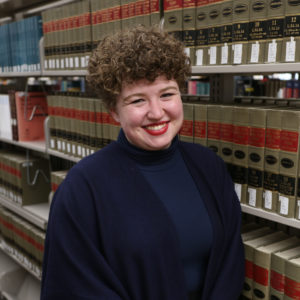 This post was written by Larry Eames, who attended the 2023 DLF Forum as a GLAM Cross-Pollinator. The views and opinions expressed in this blog post are solely those of the author and do not necessarily reflect the official policy or position of the Digital Library Federation or CLIR.
This post was written by Larry Eames, who attended the 2023 DLF Forum as a GLAM Cross-Pollinator. The views and opinions expressed in this blog post are solely those of the author and do not necessarily reflect the official policy or position of the Digital Library Federation or CLIR.
Larry Eames (he/him, Mx.) is the Digital Curation and Scholarship Librarian and the liaison to English, Theatre & Dance, Art History, and Visual Art at the Kraemer Family Library at the University of Colorado Colorado Springs. He works closely with KFL’s storytelling program, using digital collections and exhibits to highlight the work of UCCS students, faculty, and the Colorado Springs community. His research deals with student citation practices and library liaison work. In his spare time, he embroiders and plays maybe a little too much D&D. You can find him as @liblarrian on Twitter, Instagram, Goodreads, and Letterboxd.
In Search of Solutions
For the 2023 Forum, I had the pleasure of being the ARLIS/NA Cross-Pollinator. To quote my past self, I arrived a dry sponge, eager to soak up everything I could possibly learn and to grow as a librarian in the digital space. Having stepped into a new role in March, I certainly have a lot of space to grow. In particular, I was hoping for solutions. I find myself adrift in all the options for digital exhibits and digital preservation, looking for something to anchor myself to as I develop these services at my library. I had a fundamental question in each session: maybe this will be it?
From the start, I found myself answering yes. At Learn@DLF, I was excited to attend the CollectionBuilder workshops. In the past, my exhibits had been implemented with the technology to which I had access and of which I had preexisting technical knowledge. These solutions have worked well to be sure, but I need a more programmatic solution for exhibit building. CollectionBuilder feels like that solution. I left the workshops enthusiastic about the possibilities of building a static site for each of my new projects. Not only would it be easily preservable, but also be easily deployed in the hybrid exhibit space my library uses to display our digital exhibits. We show our digital exhibits on physical kiosks, giving them a visible footprint. A CollectionBuilder website would fit our need and feels implementable for someone with limited coding knowledge.
That said, I also left the workshop excited about learning more about the more technical elements. In the past, I have been consistently intimidated by anything that felt too computer science-y. After all, my background is in religious studies and art history and not in any of the cool digital humanities angles in either of those fields. The CollectionBuilder team made the code feel manageable. Sure, I can make a static site easily with GitHub pages, but with their CollectionBuilder CSV option I can take on a more challenging task to gain more control over the final output. I am certainly still intimidated. I have a lot more to learn. But Learn@DLF made me excited about the possibilities.
This theme was maintained throughout the conference. At meals, when I explained what I do, I was met with equal excitement and a willingness to talk more about what solutions were implemented at other attendees’ organizations. DLF is such a welcoming community, and I really benefited from every interaction I had. I soaked up everyone’s solutions and left with a list of possible ideas for my needs at my library. Writing this on the flight home, I can still feel my thoughts spinning over ways we could implement all the new things I learned at the Forum. This was a powerful and exciting learning experience for me. I’m looking forward to sharing what I’ve learned as widely as possible, and I hope to be able to attend future Forums and grow even more as a librarian.
